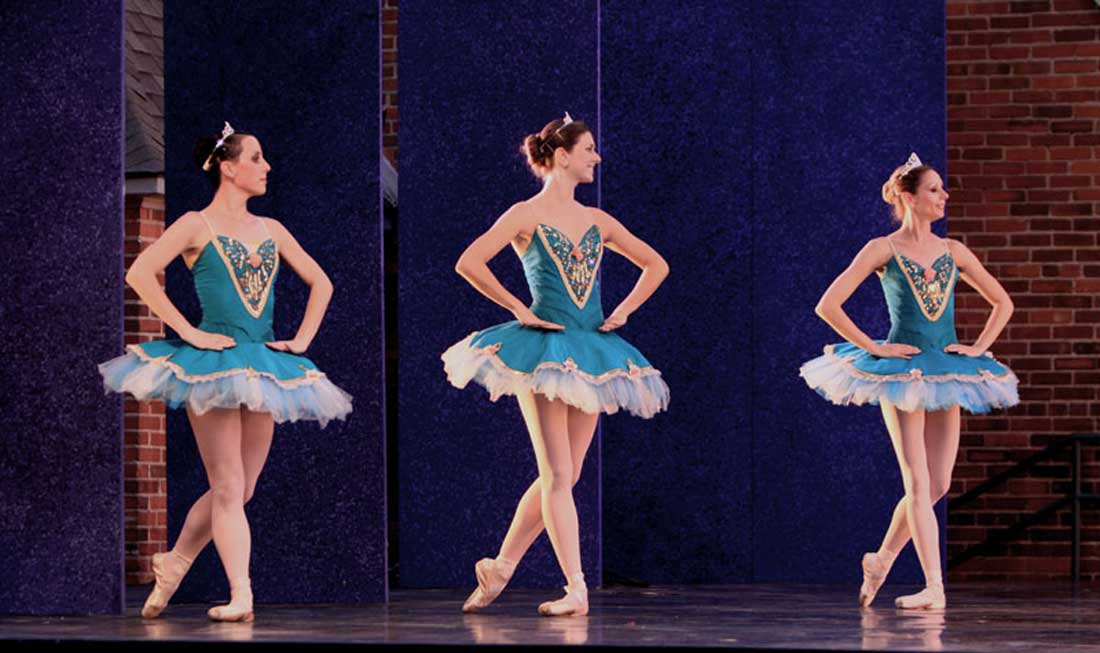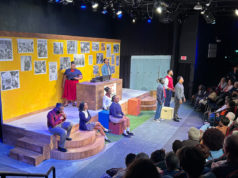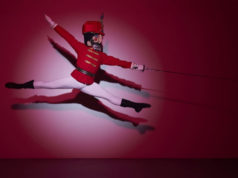During its four-day annual outdoor concert last weekend, Ballet Concerto had to fight through two major setbacks. Usually the company has to worry about only the weather. Too hot, too wet. But this year during set-up week, vandals struck the Trinity River Pavilion, throwing trashcans everywhere, messing up the lighting, and running off with some of the lumber set aside for the stage. By opening night, Thursday, the stage lights had been restored, but during intermissions and between acts, the audience sat in darkness, transforming otherwise uneventful trips to the Porta-Potties into otherworldly adventures.
By Saturday evening, full lighting had been restored, but principal ballerina Michele Gifford pulled a calf muscle during her solo in the opening ballet, Paquita pas de deux. She kept going, though, missing only the finale. The bigger problem was that she had no understudy. Company co-director Webster Dean turned to soloist Lea Essmyer, who spent most of Sunday watching the ballet on YouTube to learn the choreography. By Sunday evening and after some run-throughs with partner Shea Johnson, Essmyer went on to give a somewhat restrained but completely professional-looking performance that saved the day for Ballet Concerto.
Dean deserves a lot of credit for taking a group of dancers varying in skill levels (from student to pro) and blending them into a company in just a few weeks every year. His corps of 10 women dancing the exposed classical choreography in Paquita was wonderfully stylish. In the pas de trios on opening night, Justin Hogan with his ladies Whitney Hart and Katie O’Harra were all first-rate. Max Caro of Texas Ballet Theater joined the trio Sunday with equal success. But principal dancer Johnson stole the show with his outsized acrobatic leaps and turns each night. We used to see him regularly with the old Metropolitan Classical Ballet of Arlington until he went to Ballet Arizona. Let’s hope he finds a permanent spot closer to home now that he’s left Arizona.
Gifford’s injury also impacted the program’s second ballet, Andalusian Suite, choreographed by Luis Montero to the music of Joaquin Rodrigo. She and Johnson danced the extended middle section duet brilliantly on opening night. It’s a deeply romantic tale with a shocker of an ending.
A young woman rummaging through her jewel box gently pulls out a necklace with a cross pendant. Holding it up, she reminisces about how it came to her. She sees her lover again and relives the rhapsodic time they had together, the joy of their meeting. He gives her the necklace before another woman comes to them holding a child. She thrusts it in the man’s arms, flips her shawl at the confused girl, and marches her husband home. He’s married! Though shattered, the young woman conveys in the end that anger and bitterness have disappeared, leaving only love.
It’s a powerful bit of theater, and while you hate to see it go, its absence doesn’t affect the rest of the ballet. The opening and closing sections of Andalusian Suite are full-company folk dances with elaborate costumes. (All of the costumes were world-class.) The romantic duet gave dancers time to change. Without it there was a long pause in the middle of the ballet; no one could learn Gifford’s role in time for Sunday.
Choreographer Montero came to the rescue. During the break the next night, he, Margarita Bruce, and Perla Montoya performed a brief flamenco number that he had whipped up. Though Montero retired from public dancing some time ago, his footwork was as elegant as ever, and he and his partners earned Sunday evening’s biggest ovation. It was good to hear the women’s feet, too, since most of their work in the ballet was drowned out by an overzealous sound system.
The only ballet to survive unscathed was company founder Margo Dean’s program-closing String of Pearls, a nostalgic World War II romp set to the music of Glenn Miller and charged with the bubbly energy of a 1940s Hollywood musical. Miller’s music captured the romance of the era, especially in “Moonlight Serenade,” beautifully danced by Caradee Cline and Ruben Gerding. And Miller personified the vitality of the armed forces in “Bugle Call Rag,” an addition to the ballet choreographed by Elise Lavallee and featuring Max Caro, Ruben Gerding, Justin Hogan, and Brandon Nguyen. Dressed in khaki uniforms and presided over by Dale Luna, an Ernest Borgnine lookalike circa McHale’s Navy, the men blazed their way through a series of leaps, kicks, and gymnastic tricks that left at least one viewer exhausted and the audience cheering.
It’s performances like this that support the reputation of Ballet Concerto as an important summer outlet for young dancers to strut their stuff.












